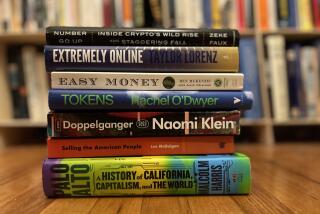‘Misfit Economy’ draws inspiration from innovators beyond the mainstream
- Share via
Hackers, pirates and swindlers, rather than visionary chief executives, should be the inspiration for business leaders. That is the view set out in “The Misfit Economy,” by Alexa Clay and Kyra Maya Phillips.
The book’s principal contention is that “the free market economy does not possess a monopoly on innovation.”
They suggest five key principles to help discover your “inner misfit.”
They are hustling (“spotting an idea and going for it”); copying (which they describe as “collective innovation”); and hacking (taking on the establishment and getting “to know a system intimately in order to more effectively take it apart”).
The other principles are provoking (sparking dialogue) and pivoting (enacting “dramatic change in the course of one’s life to pursue greater fulfillment and inspiration”).
The authors state that “while many great innovation practices have been and will be distilled from the Googles, EBays and Toyotas of the world, our research has revealed that not only has underground innovation been overlooked as a significant driver of the economy but it also offers its own unique and valuable insights.”
I am not so sure about this. Last year, the European Union ruled that its members should include illegal activities, such as prostitution and drug dealing, in gross domestic product figures.
That official data crunchers count Crime Inc.’s contribution to their economies goes some way to disproving the authors’ claims to be groundbreaking.
The writers continue: “While other innovation-related books rightly chronicle the creativity and ingenuity of fast-moving start-ups, corporate strategy and visionary CEOs, this book goes outside the conventional scope to show a broader view of the world economy.
“Formal markets are only one part of the whole. We will make visible some portion of the rest.”
The book, “The Misfit Economy: Lessons in Creativity from Pirates, Hackers, Gangsters and Other Informal Entrepreneurs” is being published next month by Simon & Schuster.
There is extensive literature on what criminals can teach law-abiding entrepreneurs.
Louis Ferrante’s “Mob Rules: What the Mafia Can Teach the Legitimate Businessman” is one example. Ryan Blair’s “Nothing to Lose, Everything to Gain: How I Went from Gang Member to Multimillionaire Entrepreneur” and “I’ll Make You an Offer You Can’t Refuse: Insider Business Tips from a Former Mob Boss” by Michael Franzese are others.
Very few contend that big companies are well placed to be innovative. More often they are criticized for moving slowly and are crippled by bureaucracy.
Authors Clay and Phillips cite two well-known business mavericks: Steve Jobs and Richard Branson. Yet the cult of the maverick entrepreneur is well established.
Few books focus on the boring accountants who steward steady businesses — not just because they are dull to read. Disruption is, after all, the business buzzword of the day. These are quibbles, however.
The book gives well-drawn and interesting examples of innovators beyond the mainstream: the Saudi entrepreneur who works with Amish camel farmers to sell their milk; the UX, a clandestine group of French art rebels who broke into the Panthéon in Paris to restore a neglected 19th-century clock.
On occasion the suggestions lapse into cliched “thinking outside the box” territory, however.
There are intriguing asides, such as how when Occupy movement participants went back to work, they were struck by how hierarchical their workplaces were, though it is less clear if they did anything about it.
But for those wanting a fresh perspective on business practices or working lives, this is a snappy introduction to a new way of thinking.
Emma Jacobs is a writer for the Financial Times of London, in which this review first appeared.
More to Read
Inside the business of entertainment
The Wide Shot brings you news, analysis and insights on everything from streaming wars to production — and what it all means for the future.
You may occasionally receive promotional content from the Los Angeles Times.










